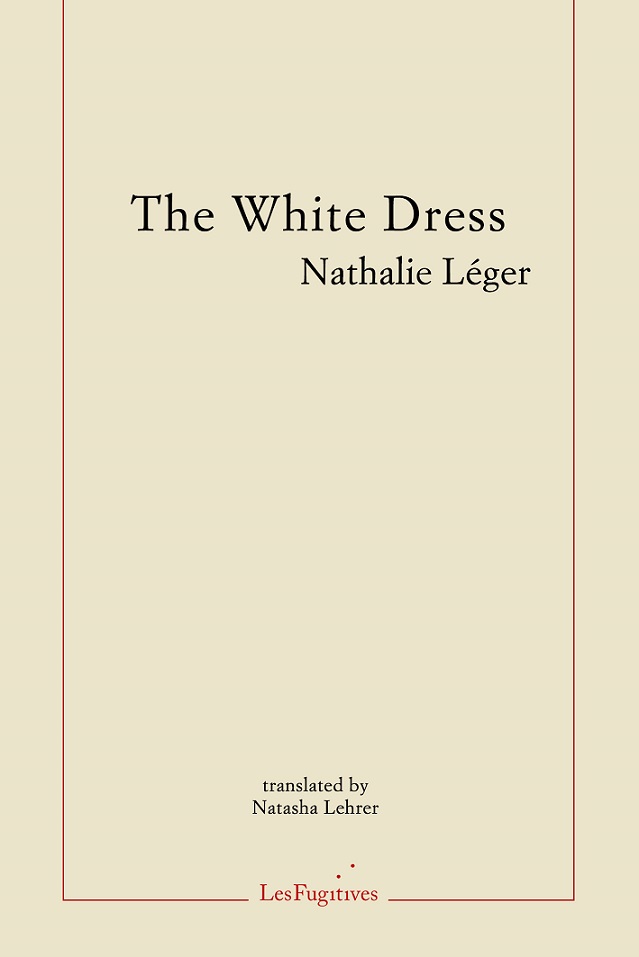Nathalie Léger: The White Dress review – masterfully introverted | reviews, news & interviews
Nathalie Léger: The White Dress review – masterfully introverted
Nathalie Léger: The White Dress review – masterfully introverted
A novel where personal and public histories are tightly knit

Nathalie Léger’s The White Dress brings personal and public tragedy together in a narrative as absorbingly melancholic as its subject is shocking.
Readers of the previous two novels by Léger – Exposition and Suite for Barbara Loden – in what is now considered a trilogy completed by The White Dress, will be familiar with her introspective style. This trio of texts in which plot takes a back seat does to a certain extent revisit the same themes. However, The White Dress shows Léger doing something new. Her melodious intertwining of another’s story with her own recalls her other works, but this is an altogether darker, altogether more unashamedly melancholic exploration of narrative. Where Exposition constantly teeters on the verge between biography and autobiography, the narrator of The White Dress is no longer so tentative. For Léger’s message seems to be that to immerse oneself in other people’s stories, whether out of pity or simple escapism, is only to find a projection of one’s own life. Everything, for this author, is inherently autobiographical.
 To reach such a conclusion might lead one naturally to consider that life is endlessly repetitive. If the other is a projection of the self; if, as the narrator writes when describing a range of acts by different performance artists, ‘it seems to me that it was me doing it’, then the implication is that all our thoughts, our actions, are only ever repetitions of others’ thoughts, actions. The White Dress shows us, however, that this is no bad thing. Léger brings out the fascination of memory, of identity, of melancholy, and shows that if life is endlessly repetitive then it is by nature endlessly literary. After all, as her narrator writes toward the end of the novel, ‘we are made of paper’.
To reach such a conclusion might lead one naturally to consider that life is endlessly repetitive. If the other is a projection of the self; if, as the narrator writes when describing a range of acts by different performance artists, ‘it seems to me that it was me doing it’, then the implication is that all our thoughts, our actions, are only ever repetitions of others’ thoughts, actions. The White Dress shows us, however, that this is no bad thing. Léger brings out the fascination of memory, of identity, of melancholy, and shows that if life is endlessly repetitive then it is by nature endlessly literary. After all, as her narrator writes toward the end of the novel, ‘we are made of paper’.
That is not to say that this is simply a book about books, a Flaubertian mockery of originality. Amongst all the self-reflexivity is a series of important, even political tensions. This is a story about family, for instance: how a relationship between mother and daughter can, through no fault of either party, border on the toxic. It is a story about femininity: a female narrator, describing the life of a female performance artist and unable to escape the life of her own female progenitor. It is undoubtedly a story about the sinister, damaging masculinity of certain men. No tensions are truly solved – in fact, the abiding frustration of the narrator is that ‘I still don’t understand’ – but throughout the narrative there is a sense that significance can still be gleaned even through a lack of comprehension. If it is a novel of failure, it is a novel showing that failure is just as worthy of representation as success.
Finally, though, The White Dress is a novel of fundamental human experience. The vagaries of the mind are ever present on the page; the reader witnesses the very enactment of consciousness. Indeed, if there are weak points in this book, these are when the narrator feels obliged to proffer biography, to recount facts about Pippa Bacca’s heritage, for instance. Léger is at her strongest in showing that really the biographical does not exist, that consciousness can never truly separate the self and the other. The ultimate question is perhaps whether this is a novel at all. What is a novel, though, if not a study of its writer?
- The White Dress by Nathalie Léger trans. Natasha Lehrer (Les Fugitives, £12)
- Read more book reviews on theartsdesk
rating
Share this article
The future of Arts Journalism
You can stop theartsdesk.com closing!
We urgently need financing to survive. Our fundraising drive has thus far raised £49,000 but we need to reach £100,000 or we will be forced to close. Please contribute here: https://gofund.me/c3f6033d
And if you can forward this information to anyone who might assist, we’d be grateful.

Subscribe to theartsdesk.com
Thank you for continuing to read our work on theartsdesk.com. For unlimited access to every article in its entirety, including our archive of more than 15,000 pieces, we're asking for £5 per month or £40 per year. We feel it's a very good deal, and hope you do too.
To take a subscription now simply click here.
And if you're looking for that extra gift for a friend or family member, why not treat them to a theartsdesk.com gift subscription?
more Books
 'We are bowled over!' Thank you for your messages of love and support
Much-appreciated words of commendation from readers and the cultural community
'We are bowled over!' Thank you for your messages of love and support
Much-appreciated words of commendation from readers and the cultural community
 Thomas Pynchon - Shadow Ticket review - Pulp Diction
Thomas Pynchon's latest (and possibly last) book is fun - for a while
Thomas Pynchon - Shadow Ticket review - Pulp Diction
Thomas Pynchon's latest (and possibly last) book is fun - for a while
 Justin Lewis: Into the Groove review - fun and fact-filled trip through Eighties pop
Month by month journey through a decade gives insights into ordinary people’s lives
Justin Lewis: Into the Groove review - fun and fact-filled trip through Eighties pop
Month by month journey through a decade gives insights into ordinary people’s lives
 Joanna Pocock: Greyhound review - on the road again
A writer retraces her steps to furrow a deeper path through modern America
Joanna Pocock: Greyhound review - on the road again
A writer retraces her steps to furrow a deeper path through modern America
 Mark Hussey: Mrs Dalloway - Biography of a Novel review - echoes across crises
On the centenary of the work's publication an insightful book shows its prescience
Mark Hussey: Mrs Dalloway - Biography of a Novel review - echoes across crises
On the centenary of the work's publication an insightful book shows its prescience
 Frances Wilson: Electric Spark - The Enigma of Muriel Spark review - the matter of fact
Frances Wilson employs her full artistic power to keep pace with Spark’s fantastic and fugitive life
Frances Wilson: Electric Spark - The Enigma of Muriel Spark review - the matter of fact
Frances Wilson employs her full artistic power to keep pace with Spark’s fantastic and fugitive life
 Elizabeth Alker: Everything We Do is Music review - Prokofiev goes pop
A compelling journey into a surprising musical kinship
Elizabeth Alker: Everything We Do is Music review - Prokofiev goes pop
A compelling journey into a surprising musical kinship
 Natalia Ginzburg: The City and the House review - a dying art
Dick Davis renders this analogue love-letter in polyphonic English
Natalia Ginzburg: The City and the House review - a dying art
Dick Davis renders this analogue love-letter in polyphonic English
 Tom Raworth: Cancer review - truthfulness
A 'lost' book reconfirms Raworth’s legacy as one of the great lyric poets
Tom Raworth: Cancer review - truthfulness
A 'lost' book reconfirms Raworth’s legacy as one of the great lyric poets
 Ian Leslie: John and Paul - A Love Story in Songs review - help!
Ian Leslie loses himself in amateur psychology, and fatally misreads The Beatles
Ian Leslie: John and Paul - A Love Story in Songs review - help!
Ian Leslie loses himself in amateur psychology, and fatally misreads The Beatles
 Samuel Arbesman: The Magic of Code review - the spark ages
A wide-eyed take on our digital world can’t quite dispel the dangers
Samuel Arbesman: The Magic of Code review - the spark ages
A wide-eyed take on our digital world can’t quite dispel the dangers
 Zsuzsanna Gahse: Mountainish review - seeking refuge
Notes on danger and dialogue in the shadow of the Swiss Alps
Zsuzsanna Gahse: Mountainish review - seeking refuge
Notes on danger and dialogue in the shadow of the Swiss Alps

Add comment